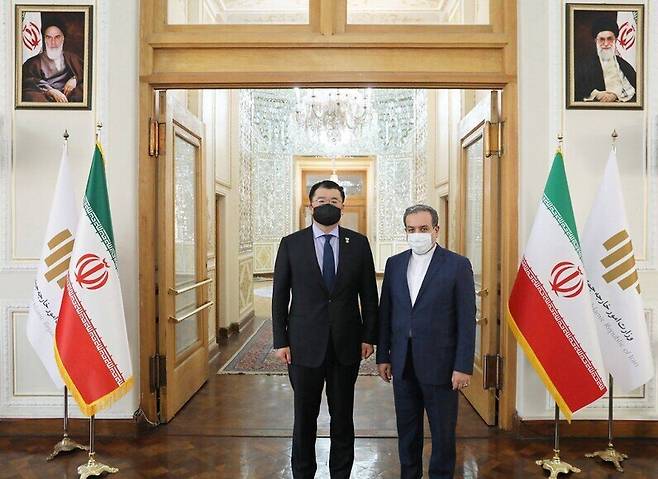Iran calls on S. Korea to unfreeze US$7 billion in payments and stop "surrendering" to US
전체 맥락을 이해하기 위해서는 본문 보기를 권장합니다.
In a press release on Jan. 10, the Iranian Ministry of Foreign Affairs briefly reported on a meeting between Choi and Iranian Deputy Foreign Minister for Political Affairs Seyyed Abbas Araqchi. According to its report, Choi said that Seoul is "resolved to rebuild trust in the bilateral ties in the new year by addressing the problems in the relations with Tehran."
In response, a South Korean Ministry of Foreign Affairs (MOFA) official said, "The first thing Vice Minister Choi did in his meeting with Deputy Minister Araqchi was to forcefully demand a swift end to the detention of the South Korean citizens and vessels."
이 글자크기로 변경됩니다.
(예시) 가장 빠른 뉴스가 있고 다양한 정보, 쌍방향 소통이 숨쉬는 다음뉴스를 만나보세요. 다음뉴스는 국내외 주요이슈와 실시간 속보, 문화생활 및 다양한 분야의 뉴스를 입체적으로 전달하고 있습니다.

Iran has demanded the South Korean government release US$7 billion in payments for Iranian crude oil, currently frozen in South Korean banks. Tehran attributed the failure to resolve the issue to a “lack of political will” on Seoul’s part, saying it has “surrendered” to the US.
This was the message delivered in a meeting with South Korean First Vice Minister of Foreign Affairs Choi Jong-kun during his visit to Tehran.
While Iran’s official position is that the seizure of a South Korean tanker is a separate issue from the frozen assets, many are concerned about the vessel’s detention dragging out into the long term. Some are calling on Seoul to find a way to release the money in question.
In a press release on Jan. 10, the Iranian Ministry of Foreign Affairs briefly reported on a meeting between Choi and Iranian Deputy Foreign Minister for Political Affairs Seyyed Abbas Araqchi. According to its report, Choi said that Seoul is “resolved to rebuild trust in the bilateral ties in the new year by addressing the problems in the relations with Tehran.”
In response, Araqchi was quoted as “point[ing] to Iranian financial assets frozen in South Korea, saying the Korean banks have illegally blocked Iranian transactions for nearly two years and a half out of fear of US sanctions.”
“This action, which is only surrender to ransom demand from the US, is not acceptable, and naturally the expansion of relations [between Tehran and Seoul] would be meaningful only when this problem is solved,” Araqchi was quoted as saying.
He was also quoted as attributing the freezing of Iranian funds to “the Seoul government’s lack of political will [to resolve the issue] rather than the cruel sanctions imposed by the US.” He went on to call for “serious efforts” from Seoul to “find the necessary mechanism for resolving the issue as a top priority in relations with Iran.” But many are skeptical as to how much freedom South Korea has to respond with US sanctions still in place against Iran.
Iran reiterated its previous claim that the South Korean vessel Hankuk Chemi had only been seized on Jan. 4 by the Islamic Revolutionary Guard Corps Navy (IRGCN) “because of technical considerations and environmental pollution hazards,” adding that “the Iranian Judiciary has begun dealing with the case.”
The Iranian Foreign Ministry quoted Araqchi as having advised the South Korean government to “avoid politicizing the issue and stay away from futile propaganda, and to allow the case to be addressed through legal procedures by the court in calm.”
In response, a South Korean Ministry of Foreign Affairs (MOFA) official said, “The first thing Vice Minister Choi did in his meeting with Deputy Minister Araqchi was to forcefully demand a swift end to the detention of the South Korean citizens and vessels.”
“Beyond that, there were very candid and constructive discussions on matters of common interest and ideas for bilateral cooperation between South Korea and Iran,” the official added.
Choi met on Jan. 11 with Iranian Foreign Minister Mohammad Javad Zarif, and attempts are also being made to organize a meeting with representatives of Ayatollah Ali Khamenei. But he does not appear likely to meet with representatives of the Islamic Revolutionary Guard Corps, the hardliners who seized the vessel.
On Jan. 10, the Financial Times quoted one hardline insider in the Iranian government as saying the South Korean government “needed a slap in the face, after our quarrels [over the crude oil payments] bore no fruits, so they realize that they cannot block Iran’s money when we are desperate to buy medicine and vaccines.”
By Cho Ki-weon and Gil Yun-hyung, staff reporters
Please direct comments or questions to [english@hani.co.kr]
Copyright © 한겨레. 무단전재 및 재배포 금지.
- 6살 숨지게 한 ‘낮술 운전’ 징역 8년…“구형보다 약한 처벌”
- 괌 침입종 뱀의 비결, 올가미로 전봇대 오르기
- 막오른 선거…안철수·나경원 ‘잰걸음’, 스텝 꼬인 오세훈
- “이루다 개발사, 연인 카톡 대화 수집하고는 돌려보며 웃었다”
- [영상] 그물에 갇혀 19일, 피 흘리며 죽어간 어린 밍크고래
- ‘미래에 대한 책임’ 첫 소송…정부 이긴 환경단체, 석유회사 조준
- “소행성 궤도를 바꿔라”…아마겟돈 실험이 시작된다
- 여의봉처럼 스마트폰-태블릿 변화무쌍…‘LG 롤러블’ 깜짝 공개
- ‘그날’도 아니고 ‘마법’도 아니고 ‘생리’입니다
- ‘연쇄 이동’ 여자배구 세터 ‘춘추전국시대’